Leber´s Hereditary Optic Neuropathy (LHON) is an inherited form of vision loss.
Although this condition usually begins in a person’s teens or twenties, rare cases may appear in early childhood or later in adulthood. For unknown reasons, males are affected much more often than females.
Blurring and clouding of vision are usually the first symptoms of LHON. These vision problems may begin in one eye or simultaneously in both eyes; if vision loss starts in one eye, the other eye is usually affected within several weeks or months.
This condition mainly affects central vision, which is needed for detailed tasks such as reading, driving, and recognizing faces. Vision loss results from the death of cells in the nerve that relays visual information from the eyes to the brain (the optic nerve). Although central vision gradually improves in a small percentage of cases, in most cases the vision loss is profound and permanent.
CAUSE OF LHON
LHON is a mitochondrial disease, as it is caused by a genetic mutation (or, variance) in the mitochondria. Mitochondria are known as the powerhouses of the cell. They are organelles that act like a digestive system, which takes in nutrients, breaks them down, and creates energy rich molecules for the cell.
A woman carrying an LHON genetic inheritance will pass it to all of her children; but, a man will never pass it to his children.

Individuals who have lost their central vision due to LHON are referred to as “affected”, whereas people with an LHON genetic inheritance, but without vision loss, are called “Carriers” or “Unaffected Carriers.”
The BusinessWire article has recently highlighted that "Leber Hereditary Optic Neuropathy (LHON) is a rare disease predominantly affecting people aged 15 to 35 years that causes irreversible and severe vision loss, resulting in blindness".
If you or someone you know are interested to learn more about Leber’s Hereditary Optic Neuropathy (LHON), LHON Canada has more information such as courses, symptoms , treatment, causes and more, click here to know more


